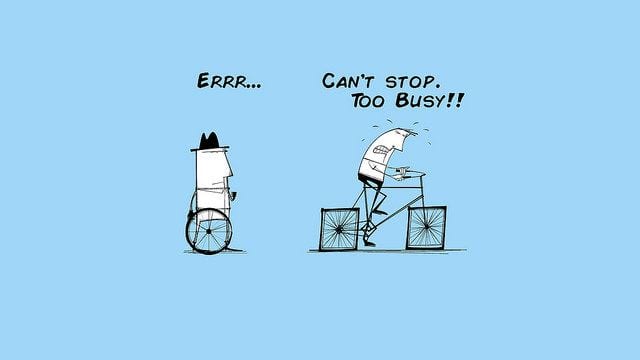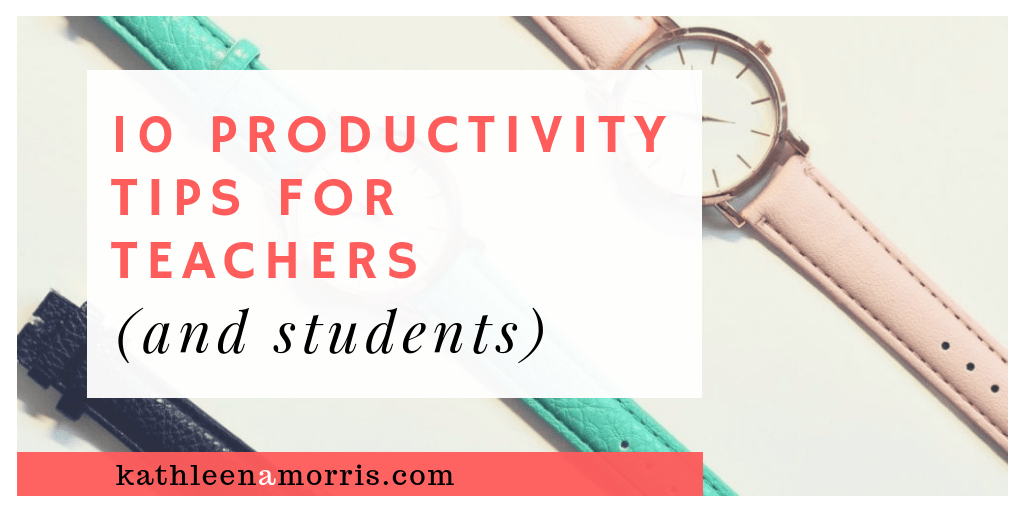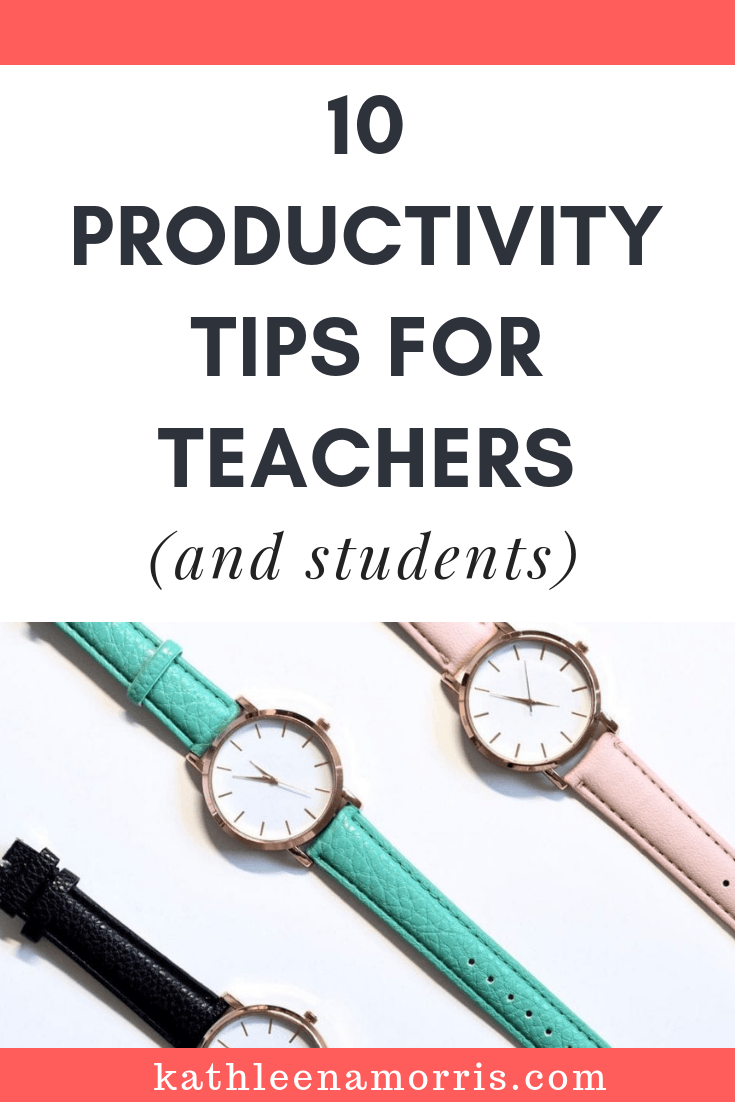I’ve always been very interested in productivity and methods for staying organised. I’m a sucker for books and podcasts about this topic and love hearing what works for other people.
This post outlines some of my favourite productivity tips to help you get more out of your day.
This topic applies to students too. Helpful work habits aren’t discussed a lot of time but are so important regardless of one’s career choice or stage of life.
Having an awareness of productivity is going to set you up for success whether you’re studying, working, or running a household.
Are you busy or are you productive?
Generally, being productive is a good aim. ‘Busyness’ can be a real thief of time. Productivity can add hours back into the day and help us get more done with less stress in less time!
Perhaps you know a teacher who gets to school early, drinks coffee, chats, flutters around and complains they can never get on top of their workload..?

10 Favourite Productivity Tips
This list is not exhaustive and in no particular order. I’d love you to share your own ideas in a comment.

1) Consider what suits you
Not all strategies are for everyone. I like hearing tips and workflows from others but it’s up to you to decide what will work for you.
A useful reference is Gretchen Rubin’s Four Tendencies which explains why we act and why we don’t act. Beating yourself up about why strategies work for other people and not you is not helpful.
2) Do the actual work
This is obvious but it’s easy to be busy but not really achieve much.
Are you avoiding doing the actual work you need to do?
This might be because of procrastination or you might be thinking too much about tools, hacks, apps, planners and find you’re basically circling around the edges of your work!
Dive in, take action and steer clear of anything that’s distracting you from just doing the work. Starting can be hard but once you start, it’s easier to keep going.
3) Don’t sit at a computer without a plan
Do you open up your laptop every night by habit? What are you doing? Are you achieving what needs to do be done or just browsing, scrolling, and multi-tasking?
I’ve found it really helpful to consider what I’m actually going to work on as I sit down at my computer.
4) Catch yourself going on tangents
This relates to the tip above. When you’re working online, you’re leaving yourself open to all sorts of distractions. There are apps and add-ons to clear distractions, however, I prefer a metacognitive approach. Just keep thinking to yourself, am I on track? Am I going off on a tangent?
It’s easy to start down a rabbit trail of link clicking which can take you away from your true work.
5) Don’t touch something twice… or the two-minute rule
There are different variations of this ‘rule’ but I’ve always found it helpful. If something needs to be filed and will only take a second, do it right away. If you have a small mess to attend to, doing it straight away will pay off. If an email only requires a quick response, reply instantly and be done with it.
On the flipside, this may lead to you spending a lot of time putting out spot fires and never getting to your deep work, but I’ve found it helpful as a general rule.
6) Declutter and reset time
I know this isn’t important to everyone but for me, an uncluttered physical environment definitely helps me to feel calmer and more productive.
Even if you don’t want to focus too much on keeping your environment uncluttered, consider taking time to ‘reset’ approximately once a week. This might mean coming up with a new ‘to-do’ list, updating your calendar, filing documents and receipts, clearing your computer desktop, and tidying your desk.
I believe ‘reset time’ and the ‘two-minute rule’ were both originally popularised by David Allen, the author of Getting Things Done. David’s work is certainly helpful if you want to dig deeper into this topic.
7) Deep and light work
We all have deep work and light work to do. Deep work might be writing student reports or putting a new curriculum together. Light work might be browsing for some new book titles or sorting through emails.
Consider when your energy levels and environment are most suitable for tackling deep work. Maybe it’s early in the morning before you leave for work, or while the school building is still quiet.
Save those lighter tasks for times when you’re tired, or for when the workplace is noisy and it’s hard to concentrate.
You might have heard of the popular book ‘Eat That Frog’ by Brian Tracy. He suggests attacking your hardest or most important task first to set yourself up for a productive day. Something to keep in mind perhaps.
Some say being productive is less about time management and more about managing your energy. Food for thought.
8) Write it down
This is something I’ve been trying to be more conscious of. I used to rely on my memory a lot which worked out okay for me but I’m finding the act of writing down tasks and thoughts helps to clear the mind.
You’ve written it down so you can stop thinking about it for now and focus on other tasks.
How you like to write down your thoughts and to-dos is a personal decision. Despite embracing many digital tools, I just love the feeling of a nice marker writing on some good quality paper. Not to mention the satisfaction of physically crossing off tasks!
I segment my notebook into different compartments that I need to work on — this blog, The Edublogger, teaching, household tasks and so on. I find compartmentalising ‘to-dos’ helpful as well.
9) Don’t multitask
The research is pretty clear on this one — it’s physically impossible to perform two tasks at the same time. Multi-tasking actually means quickly switching between tasks. And precious time can be lost while switching.
This is one I’m generally conscious of, however, I am really bad at waiting for pages or files to load. I just can’t stand to twiddle my thumbs so will immediately switch to another task. I have heard that this is also a thief of time so is probably something I should address!
10) Rely on your PLN, team, and students
Teaching is an impossible job. We can never do enough. It never ends. There are constant inner and outer pressures. So the only way to not burnout is to really work together and realise you can’t do everything.
You don’t need to reinvent the wheel for every activity or task. Relying on your wider PLN or school team more can mean everyone can be more productive. Investing time in those give and take relationships can pay off and help you get more out of your day.
The other part of this equation is to always consider if you’re doing something for your students that they could be doing for themselves. This habit could be doing yourself and your students a disservice. Read more about this in a recent post by George Couros.
What Can You Add?
That’s some of my favorite tips but there is a lot I didn’t cover. I’d love you to share a comment and tell us what works for you. What doesn’t work for you? What are your productivity goals and what are your foibles? Do you have any tips for dealing with emails, meetings, or paperwork?
Productivity isn’t about striving for perfection but can lead to more work satisfaction, less stress, and more free time for doing what you want to do.
Perhaps spending time being more productive with work should mean being more focussed with non-work related activities too? So, if you’re going to read a book or watch a movie, just enjoy it. Don’t let your thoughts drift to work or interrupt your leisure time with checking email.
Work hard and play hard! That’s my goal. 😄
You Might Also Enjoy
Five Tips For Teaching Students How To Research And Filter Information
8 Ways Teachers And Schools Can Communicate With Parents
Teaching Children About Digital Footprints and Online Reputations



Hi Kathleen!
Love your productivity tips! While it may be extrinsic, I find having a fun get-to-do after completing a time-intensive (and often, brain-intensive) project rewarding (no pun intended). It might be seeing a movie I really want to see, baking cookies or cakes, or attending a special event:-).
Excellent idea, Janet! I often think I should set myself rewards things like that. Sometimes I like doing this on a small scale. Like when I’m working at night I think when I finish a certain task I can read my book or eat dessert!
This topic reminds me of this sort of meme you see on social media! https://goo.gl/images/CLzA9T
I really like your point Kathleen that not every strategy works for everyone. The thing that I would add to that is that not every strategy that works for you will work every time.
In my new role I really had to think hard about what strategies I use to stay productive. This was working until I changed teams and subsequently work. Being a lot more collaborative and involving a centralised response system, I have tried (and failed) a number of strategies to make it all work for me. One approach was to create a Google Sheet, which was organise into categories and had a status column which allowed me to prioritise.
I liked this setup as it allowed me to easily change the statuses and add links to further information. The issue is that it involves a lot of doubling up between systems.
In the end, I am getting what needs to be done completed at the moment, but I am still looking for something more productive.
Syndicated from Read Write Collect
Ah that is definitely a good point that every strategy that works for you won’t work every time. Very true. I guess it’s something that is always evolving when tasks, environment, colleagues etc change.
You’re probably like me. I’m always wondering — is there a better way?
Thanks for chiming in, Aaron!
I love all of your points! The last one has to be my favorite. “Rely on your PLN, team, and students.” is a great tip and can go so far. It is almost impossible to create unique and meaningful lessons, stay caught up with paperwork, and differentiate for students with no help from others and no support. As a person who likes to try to do it all and doesn’t like asking for help, I can see how this tip will be a time and stress saver.